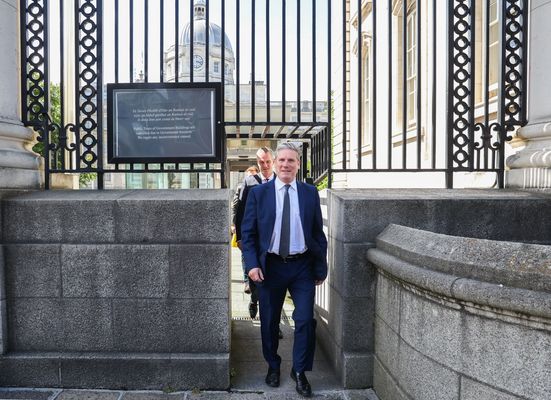THREE days before the deadline for restoring the Executive, Deirdre Hargey’s Department for Communities published a report by an independent advisory panel reviewing welfare mitigation schemes. This report is not part of an anti-poverty strategy as such, but it does discuss measures designed to mitigate some of the worst effects of the British Government’s ‘welfare reforms’ of the past decade. The immediate crisis of energy costs and inflation is another matter.
Along with all the members of @CliffEdgeNI we warmly welcome the @CommunitiesNI Welfare Mitigations Report with strong condemnation of two child limit & strong evidence for a Child Payment as part of an Anti-Poverty Strategy for NI #endchildpoverty https://t.co/Zj5qQvZEl7
— Action for Children NI (@Actn4ChildrenNI) October 26, 2022
To re-cap, the Northern Ireland Act 1998 was amended in 2006, following the St Andrews Agreement, to include Section 28E which states: “The Executive Committee shall adopt a strategy setting out how it proposes to tackle poverty, social exclusion and patterns of deprivation based on objective need.” In 2015, the Committee on the Administration of Justice won a High Court judgement against the Executive for failing to adopt such a strategy. Justice Treacy’s verdict was that a strategy “must aim to be effective, its effectiveness must be capable of measurement and the actions which are taken in attempting to implement that strategy must be referable back to that overarching strategy”. No such strategy was in place.
Fast forward to August 2020, when Minister Hargey appointed an expert advisory group to set out what an anti-poverty strategy should look like. The group was given until Christmas to produce a report, which it did. A ‘co-design’ group was then assembled to work with the department on developing the strategy further. At the same time, other groups were working on various aspects of social exclusion.
Huge thanks @DeirdreHargey for all you did for the V/C sector as @CommunitiesNI Minister incl. the responses to COVID and the cost of living, independent reviews of welfare mitigation +discretionary support, and trying to move the anti-poverty strategy forward. 1/2
— Jonny Currie (@scrabopower) October 27, 2022
The anti-poverty strategy has yet to appear. If and when it does, the strategy will require Executive approval as it is likely to include new legislation and cross-cutting commitments involving a number of departments. Meanwhile, a few of the expert advisory group’s recommendations for an anti-poverty strategy have seen the light of day, whether inspired by its report or not.
For example, the report recommended that the executive should take the lead on addressing low pay by declaring NI Government as a Real Living Wage and a ‘Living Hours’ employer. In fact this was agreed in New Decade New Approach. Finance Minister Conor Murphy has now built the Real Living Wage concept into government procurement: since June 1, 2022, companies awarded government contracts must pay employees at least the living wage as set by the Living Wage Foundation.
This is important. The latest figures published last week are for 2018 and show that 28 per cent of all employee jobs in the North pay an hourly rate below the real living wage rate (£8.75 in 2018). In Scotland the rate is 19.4 per cent. For women in part-time work in the North, almost half (47 per cent) are paid below the hourly rate.
One of the points made in the expert advisory group’s anti-poverty report was that the benefits system itself had become a driver of poverty. It therefore recommended reversing a number of recent changes, including cuts in the value of benefits, a permanent end to the ‘bedroom tax’, getting rid of the odious two-child limit, the benefit cap and the five-week wait for Universal Credit, widely recognised as a major factor behind the growth in foodbank use.
Before last May’s election, Minister Hargey steered the Welfare Supplementary Payments (Amendment) Act through the Assembly. Effectively, this abolishes the bedroom tax (a penalty deducted from Housing Benefit or Universal Credit where people are deemed to have a spare bedroom). Around 37,000 households benefit from this.
The advisory panel reviewing welfare mitigation schemes takes this further by recommending three main changes for the period 2022/3 to 2024/5. The first is a carer’s recognition payment, as in Scotland. They point out that carers save the North’s economy about £4.6 billion per year, yet support for carers is minimal. About 50,000 carers would benefit from the recognition payment.
The panel also recommend introducing a ‘cost of work’ payment for low earners on universal credit, designed to benefit about 40,000 families with children. The third main recommendation is to offset the two-child limit. As they put it: “We would never contemplate restricting health care or schooling to only the first two children yet currently do so through certain social security benefits. This cannot be right.”
In total, the new mitigations recommended by the review panel amount to £133 million in the current year, rising to £150 million by 2024/5. This compares to annual cuts to spending on child and working age benefits of £193 million from 2015/16.
So we are going backwards and none of the attempts to move forwards will come to anything in the absence of an Executive. Even when hundreds of thousands in the North stand to gain (or lose less) from devolution, the DUP prefers to put the cult of Brexit and the principle of the union above all else, irrespective of the harm done, and that will continue to be done, as Sunak’s government hovers over further cuts to public services.
Attended the #CrushedbyCOL event today n Stormont. Had to call out that DUP only party blocking an Executive, anti-poverty strategy, bill of rights, mitigations… same pattern for years. Tories & DUP are bad for health, cost of living, social care, human rights & equality. Siné
— ⭕️ CarálNíChuilín (Sí/í)Is Deontóir Mé ✊ (@CaralNiChuilin) September 21, 2022
As it is, the current constitutional settlement is particularly flawed in the case of social security policy which is technically devolved but the budget for which is directly controlled by the Treasury outside of the block grant. National Insurance contributions are a matter for Westminster and we are not involved in a democratic discussion of taxation more generally, local rates being the minor exception. We are instead gifted what feels like an infantilising squabble over the block grant. The prospects for an effective anti-poverty strategy are not good.
Compare this to the policy discussion on taxes and benefits in the Republic, recently stimulated by 'Foundations for the Future', the report of the Commission on Taxation and Welfare, published in September. Ignore for a moment Tánaiste Leo Varadkar's hasty dismissal of some of the Commission’s proposals as “straight out of the Sinn Féin manifesto” and consider instead the way the discussion is framed.
Fine Gael has spent the past week dissing the recommendations of the Commission on Taxation and Welfare.
— Hugh O'Connell (@oconnellhugh) September 22, 2022
Turns out the party never even made a submission for the commission to consider https://t.co/BufGB6y9qT
The 500-page report begins: “Taxation and welfare policies […] have a major bearing on numerous aspects of economic and social policy. They are part of a wider social contract – the set of rights and mutual obligations that come with living in Ireland. For this reason, debates over taxation and spending lie at the heart of our democratic tradition.” Feeling the democratic deficit yet?
This report is about long-term strategic thinking on appropriate forms of taxation to sustain social and economic objectives, with more emphasis on the taxation of wealth than exists at present. The Commission argues for significant improvements in the welfare system that include poverty reduction and supporting employment. It regards the regular review of the adequacy of benefits as essential, unlike the British Secretary of State for Work and Pensions, now at Health, sorry the Environment (Thérèse Coffey) who dismissed outright a recommendation from the Work and Pensions select committee to investigate benefit adequacy, something which no government has undertaken in Britain since the 1940s.
So if you are not yet too exhausted from lack of food and heat, why not channel some of that anger and despair at the road-to-nowhere DUP and prepare for the future by reading the Commission’s report.








